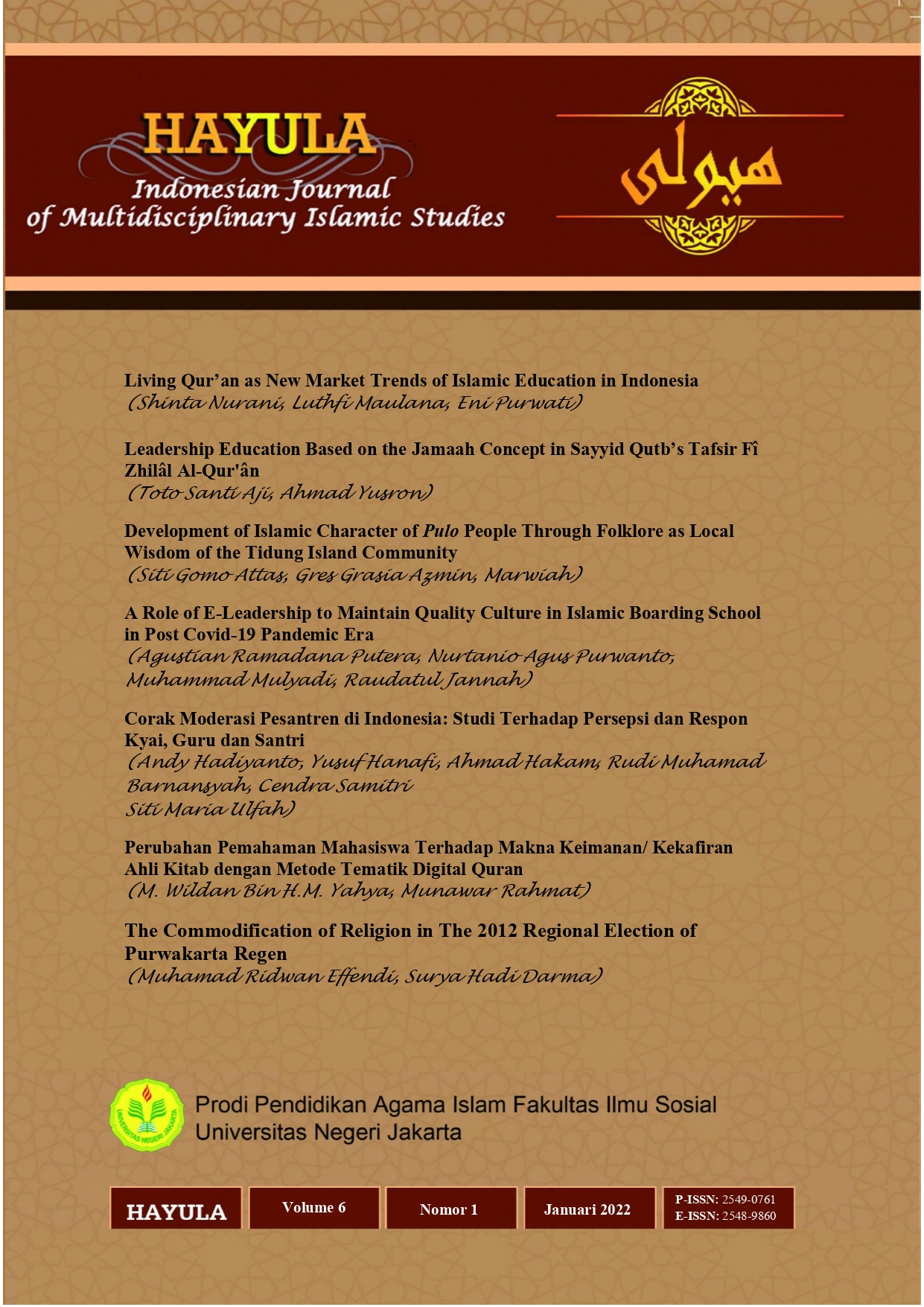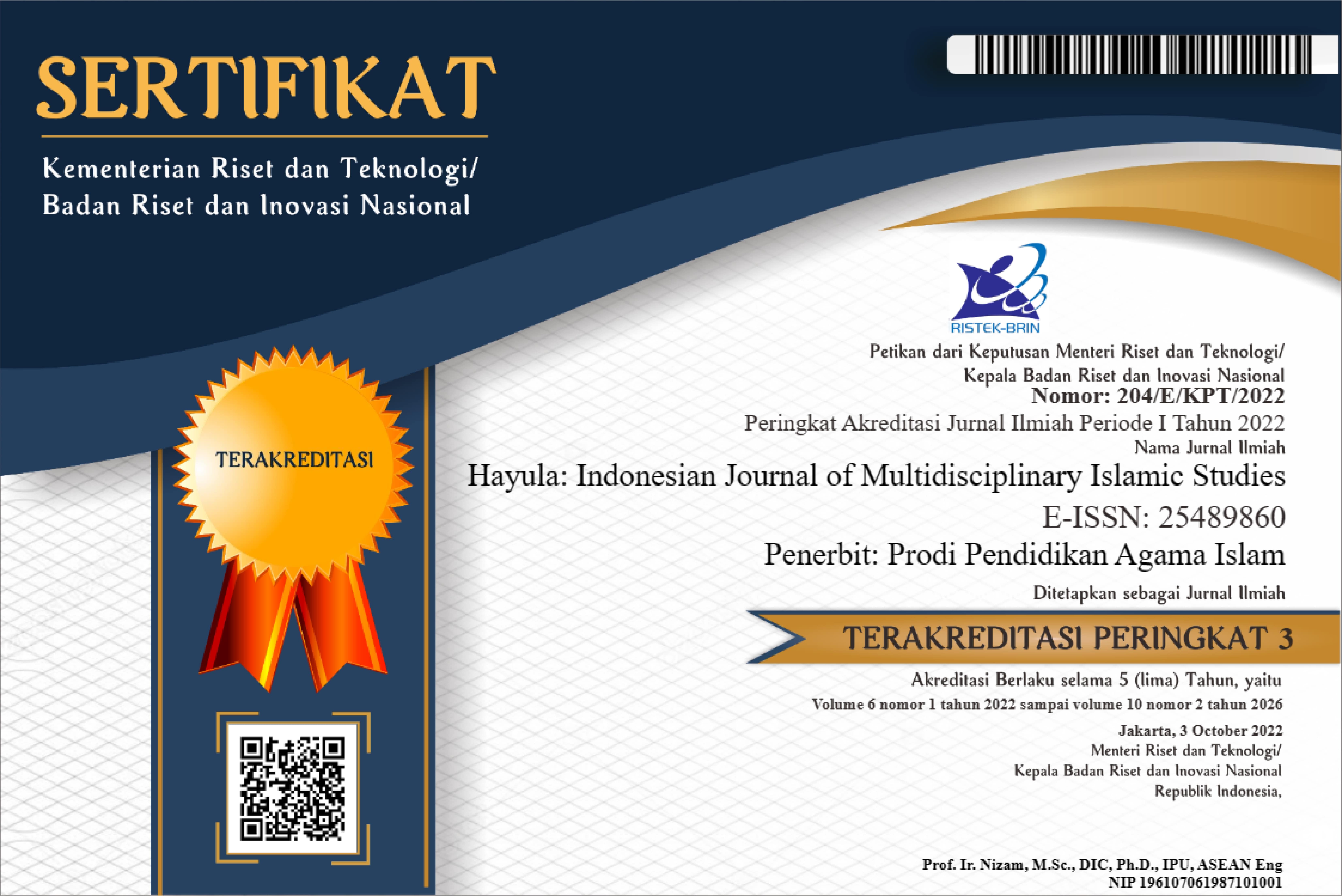Development of Islamic Character of Pulo People Through Folklore as Local Wisdom of the Tidung Island Community
DOI:
https://doi.org/10.21009/hayula.006.01.03Keywords:
oral tradition, Islamic character, folklore, local wisdom, Tidung IslandAbstract
The development of the Islamic character of the Pulo people through the folklore of Panglima Hitam and Raja Tidung as local wisdom of the people of Tidung Island. Tidung Island, which is now a tourist destination, is slowly undergoing changes in the lives of the island's people who were originally a fishing community, now turned into a tourist destination. The shift in function which originally had a fishing tradition turned into a tourist resort that is ready to accommodate the coffers of tourists who come and go to Tidung Island. The existence of Tidung Island is recorded in an oral tradition of folklore that is still known by the people, namely the Panglima Hitam folklore and the story of Raja Tidung. The value of Islamic character as local wisdom is used to read the two folk tales, especially the character development of the younger generation on Tidung Island. The Islamic character of the island community that must be developed includes: (1) moral values to God, (2) moral values to others, and (3) moral values to oneself. These three Islamic characters serve as character models used by the community to develop the potential of the Tidung Island community.
References
Basri, Muhammad Mu’inudinillah. (2008). Indahnya Tawakal. Universitas Muhammadiyah Surakarta: Indiva Pustaka.
Geertz, Clifford. (1973). The Interpretation of Cultures. New York: Basic Books, Inc., Publishers.
Hakam, Ahmad. (2017). Communal Feast Slametan: Belief System, Ritual, and the Ideal of Javanese Society. Hayula: Indonesian Journal of Multidisciplinary Islamic Studies, 1(1), E-ISSN 2548-9860.
Hardisman. (2017). Tuntunan Akhlak dalam Al-Quran dan Sunnah (Membentuk Pribadi Muslim Berkarakter dan Penerapannya pada Etika Kedokteran). Padang: Andalas University Press.
Lord, Albert B. (2000). The Singer of Tales. London: Harvard University Press.
Maulana, Nurmansyah Triagus, dkk . (2018). Analisis Struktural dan Nilai Pendidikan Cerita Rakyat Serta relevansinya Sebagai Bahan Ajar Bahasa Indonesia di SMP. Jurnal Gramatika: Jurnal Penelitian Pendidikan Bahasa dan Sastra Indonesia, V4.il, 139-149, ISSN 2442-8485.
Nimpuo, HB, dkk. (2014). Kamus Umum Bahasa Indonesia Edisi Baru, Pandom Media, hal. 410. Lihat juga KBBI Online https://kbbi.web.id/karakter, dan Echols, J.M, & Shadily, H. (1980). Kamus Inggris Indonesia, cet.VIII, Jakarta: Gramedia, hal. 107.
Rani, Abdul, dkk. (2013). Analisis Nilai-Nilai Akhlak Islam dalam Kumpulan Cerita Rakyat Anak Hantu. Pontianak: Universitas Tanjung Pura.
Sakdiah. (2016). Karakteristik Kepemimpinan Dalam Islam (Kajian Historis Filosofis) Sifat-Sifat Rasulullah. Jurnal Al-Bayan, 22(33). Januari-Juni 2016.
Siregar, Siti Fatimah, dkk. (2018). Karakter dan Akhlak Pemimpin dalam Perspektif Islam. Journal of Education, Humaniora and Social Sciences (JEHSS), 1(2), 110-116, ISSN 2622-3740.
Wagiran. (2012). Pengembangan Karakter Berbasis Kearifan Lokal Hamemayu Hayuning Bawono (Identifikasi Nilainilai Karakter Berbasis Budaya). Jurnal Pendidikan Karakter, Tahun II (3). FT Universitas Negeri Yogyakarta.
Zamzam, Rizal. (2018). Sejarah Agama Islam di Kerajaan Mataram pada Masa Panembahan Senopati. JUSPI: Jurnal Sejarah Peradaban Islam, Tahun 2018, 2(2), 1584-1601, ISSN 2580-8311.
Downloads
Published
How to Cite
Issue
Section
License
Authors who publish with this Journal agree to the following terms:
- Author retain copyright and grant the journal right of first publication with the work simultaneously licensed under a creative commons attribution licensethat allow others to share the work within an acknowledgement of the work’s authorship and initial publication of this journal.
- Authors are able to enter into separate, additional contractual arrangementfor the non-exclusive distribution of the journal’s published version of the work (e.g. acknowledgement of its initial publication in this journal).
- Authors are permitted and encouraged to post their work online(e.g. in institutional repositories or on their websites) prior to and during the submission process, as it can lead to productive exchanges, as well as earlier and greater citation of published works.
Users/public use of this website will be licensed to CC BY







